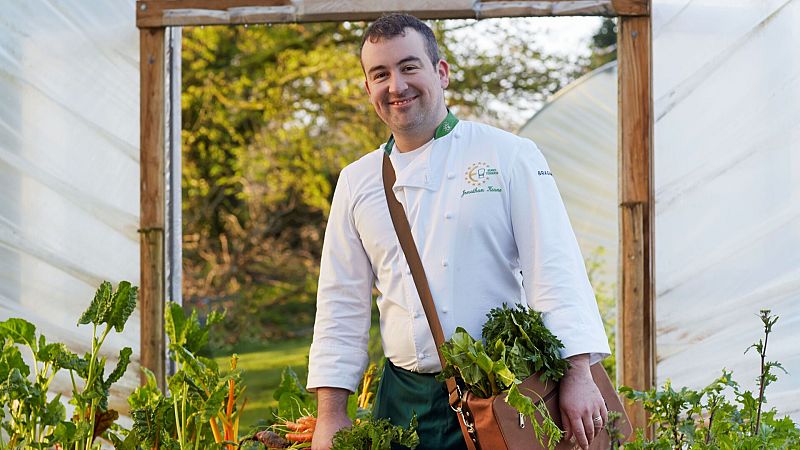
A Sustainable Transformation at The Lodge at Ashford Castle
At The Lodge at Ashford Castle, a historic 19th-century villa nestled in the lush green landscapes of County Mayo, Ireland, the approach to food waste is anything but conventional. Instead of tossing leftover scraps into the bin, they are transformed into cocktails, canapés, or compost. Over the past year, the hotel has managed to cut its food waste by nearly 60% by weight and its food trimmings by 90%. This translates to 11.5 tonnes of food waste, almost 50 tonnes of carbon emissions, and more than €16,000 saved annually.
This remarkable achievement is largely attributed to the leadership of executive chef Jonathan Keane, who has championed sustainability as a core principle in the kitchen. “Instead of hundreds of small initiatives, we decided to go after the stuff that would actually make a difference,” he explains. Keane leads the kitchen at the 64-room sister property to the medieval Ashford Castle, where his vision for sustainability extends beyond mere gestures.
From Trim to Transformation
The process begins with an understanding of what is being wasted. At any given time, the kitchen serves over 500 meals and deals with large quantities of produce. For instance, Keane recently had 650 kilograms of watermelon rind on hand and asked himself, “What can I do with that?” The answer, it turns out, is quite a lot.
Over the past three years, The Lodge’s parent group, Red Carnation Hotels, has partnered with Winnow, a UK-based food waste analytics firm. Their AI-powered tools and image recognition technology help Keane track and categorize what gets thrown away each day. “I get an email every morning that tells me exactly what food went into the bin,” he says. “If two kilos of onion skins went into the bin, I’ll see a picture of that. Then I can investigate why that happened instead of [the skins] going into stock or treacle.”
With this data-driven approach, the team has learned to upcycle ingredients like trimmings, peels, and offcuts into syrups, muffins, canapés, and even welcome drinks. What little waste remains is sent to a biodigester, which produces nutrient-rich fertiliser for the estate’s sprawling garden—a project initiated during the pandemic to promote self-sufficiency and environmental consciousness.
A Vision for the Future
The garden became the first phase of a larger transformation. Keane envisions a future where The Lodge becomes fully self-sufficient, with plans for a tunnel greenhouse, a future distillery with its own orchard, and aquaponics systems that combine fish farming with hydroponic vegetable gardening.
The Hidden Problem in Hospitality
The hospitality sector has long been a significant contributor to global food waste. According to the UN Environment Programme, restaurants, hotels, and other venues generated more than 25% of the world's 1.3 billion tonnes of food waste in 2019. Much of this ends up in landfills, releasing methane, a potent greenhouse gas.
Vojtech Végh, Winnow’s zero-waste culinary advisor, highlights the challenge: “Much of it goes uncounted, so we don’t even know the real scale.” He emphasizes that the first step toward addressing this issue is equipping chefs and hotels with information. “Once we start to measure our food waste, we can then focus on what exactly we need to reduce.”
A Growing Shift in the Industry
Across the industry, hotels are beginning to recognize the environmental and economic costs of unmeasured food waste. At the Hilton Tokyo, chefs have started reusing vegetable trimmings and fruit peels in soups, desserts, and drinks. Novotel London Excel has also used Winnow’s tools to cut waste by around 50% in recent years.
In Southeast Asia, startups like Yindii are connecting hotels, restaurants, and bakeries with local diners. Surplus food is sold at a discount through their app, helping to prevent perfectly good food from being discarded.
Rethinking Kitchen Operations
For Végh, the key to long-term success lies in rethinking how kitchens operate at a systemic level. “Zero-waste cooking is more about how we think when we cook rather than how we cook,” he says. “If we embed food waste prevention into our processes—rather than build it on top—then step by step it becomes the new standard in any kitchen.”
A Culture Shift from the Kitchen Out
Keane believes that true change starts with people. “Sustainability has a lot to do with people, which isn’t always high on the agenda in kitchens,” he says. To foster a positive environment, he has created a culture where his team of 18 kitchen workers feel valued and respected. “We’re nice to each other. We treat each other like adults, and we have the same approach with the ingredients and the produce.”
Keane also encourages his team to connect with nature. As an avid forager, he regularly takes his colleagues into the forest to search for wild vegetables and mushrooms. He believes this not only builds morale but also reinforces the sustainable practices he wants The Lodge to embrace.
He also involves hotel guests in these experiences, subtly transmitting a message that he hopes will resonate long after they check out. “We’re not preaching. We’re bringing the customer along with us [at their own pace],” he explains. “We want to leave a legacy.”


Posting Komentar